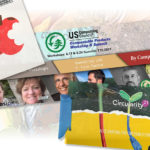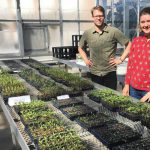BioCycle August 2015
Surplus Food And Enterprise Development
A paper recently published in Food and Nutrition Sciences, “New Sustainable Market Opportunities for Surplus Food: A Food System-Sensitive Methodology (FSSM),” by T.H. O’Donnell, J. Deutsch, C. Yungmann, A. Zeitz and S.H. Katz, explains the initial applied research underway in the Philadelphia region to divert and use surplus supermarket produce as inputs for new food products. “Our objective is to demonstrate that fresh, ripe fruits and vegetables that grocers remove from sale primarily for cosmetic or packaging reasons can become a large, local source of low cost inputs for new and sustainable food production,” note the authors. The research team included U.S. EPA Region 3, U.S. Department of Agriculture, Drexel University, the University of Pennsylvania, food retailers and food rescue organizations and numerous others.
Describes the paper’s abstract: “Nearly 35,000 pounds of produce were culled from a grocery store chain in Philadelphia. Twenty-five percent of this was not suitable for culinary uses, 10 percent consisted of relatively small quantities of food that did not warrant further research, and about 33 percent is suitable for use at area food shelters and pantries. An experimental sample taken from the remaining 15,000 pounds was used for recipe research and development for diversion to new commercial enterprises. We analyzed a scenario where a supermarket receives $0.25 per pound for culled produce, generating about $8,700 in average monthly revenue while eliminating disposal costs. New commercial possibilities for the unused food were then explored. The scenario included community-based enterprises that could process the produce into value-added products that could be wholesaled back to the store at sufficient profits to support two to four community employees. Extrapolating these results to the approximately 38,000 large supermarkets in the United States suggests that much of the 1.1 billion pounds of produce that is currently sent to landfills can be repurposed. If diverted to new foods each of the 46.1 million SNAP [Supplemental Nutrition Assistance Program] recipients could figuratively receive an equivalent of 24 pounds of fruit and vegetable products per annum.” An article based on the study is being written for an upcoming issue of BioCycle.
Film Recycling Wrap Up
The Wrap Recycling Action Program (W.R.A.P.), a new national public awareness campaign, is acquiring new partners that should help achieve its target of doubling the amount of plastic film recycled from one billion pounds in 2013 to two billion pounds by 2020, according to a U.S. Environmental Protection Agency’s Sustainable Materials Management webinar in mid-July. W.R.A.P. builds on a two year-old public-private plastic film recycling initiative called Wisconsin WRAP—Recycling Plastic Film Beyond Bags that brought together the Wisconsin Department of Natural Resources, the American Chemistry Council’s (ACC) Flexible Film Recycling Group (FFRG) and GreenBlue’s Sustainable Packaging Coalition (SPC). Funded by FFRG members, who represent the polyethylene film industry, W.R.A.P. specifically aims to boost recycling of HDPE #2 and LDPE #4 bags, wraps, and films that are found in nearly every business and household, including drink case wrap, bread bags and paper product wrap.
W.R.A.P.’s latest educational campaign launched on Earth Day in Milwaukee at 10 Roundy’s retail grocery locations. Each store got new blue, plastic film-only receptacles and 4,000 educational bag stuffers to instruct shoppers on which items to return to the store bins rather than their curbside recycling bins. (Milwaukee’s recycling bins do not accept plastic film.) Roundy’s recycles the material with the Trex Company, which turns it into composite decking or pellets for manufacture of other products like new bags or pipe. An audit of the results is still underway, said Cynthia Moore, a Wisconsin DNR regional program manager.
The Roundy’s collaboration is just the beginning, noted Shari Jackson, ACC director of film recycling. Walmart is “definitely interested,” Vancouver, Washington has set a WRAP Return to Retail Campaign for August and September, and ACC is working to convince CalRecycle to initiate film recycling public outreach in California. “We’re exploring ways to increase participation rates, as well as the types and amounts of plastic film collected,” said Jackson during the webinar. “We aim to keep building on the increase in film recycling that was achieved nationally in 2013.”










